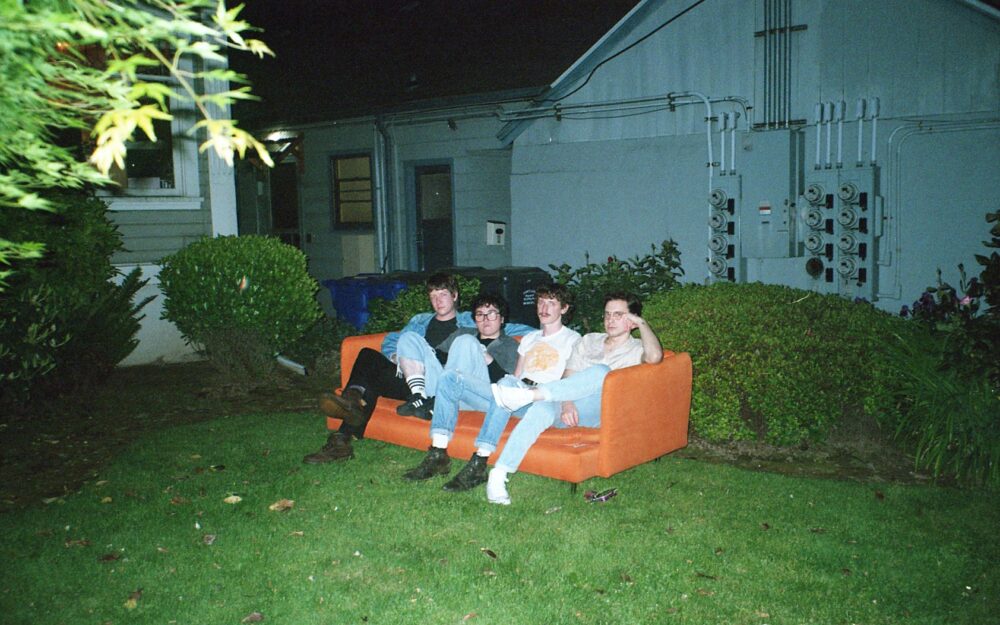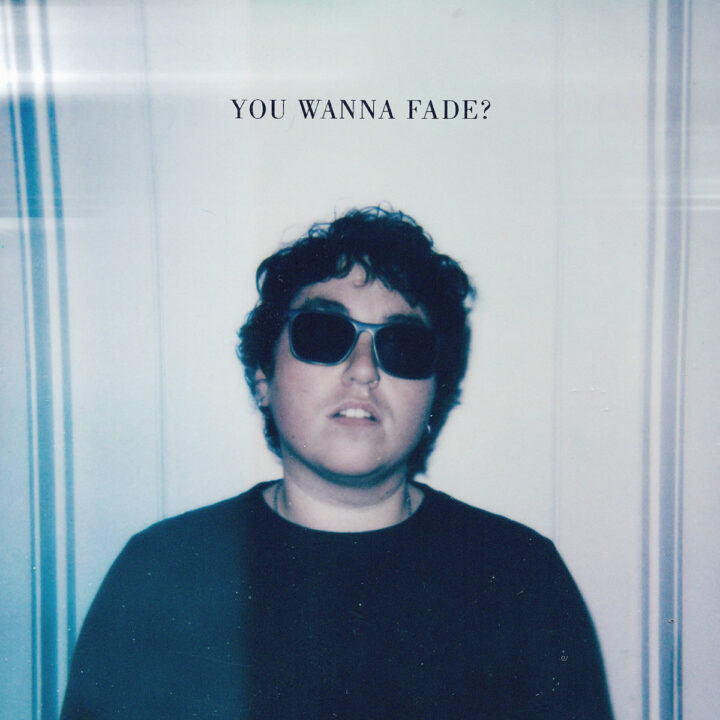Guitars, Guitars, Guitars: Alien Boy On Their Ambitious New Album You Wanna Fade?

When Alien Boy first started playing shows in 2018, venues had no idea how to handle their fearsome three-guitar setup. Seven years later, the Portland music scene is inundated with loud, young rock bands, some of whom (including Growing Pains and Rhododendron) had members mentored by singer Sonia Weber at Portland’s School Of Rock. Yet Alien Boy’s sound remains distinct, an impossibly lustrous wall of guitar noise that sounds like a waterfall of molten gold, already fully formed on 2018’s Sleeping Lessons and its epochal opener “Somewhere Without Me.”
Indie rock fans might notice that the album shares its name with a Shins song, and those with longer-reaching ears will recognize the band’s name as a reference to a 1980 Wipers EP. Alien Boy are cognizant of Portland’s long-running rock tradition, and their music simultaneously transcends it and is very much of it; despite its reputation as a twee mecca, Portland has been at the vanguard of loud rock ‘n’ roll since the Kingsmen slurred their way through “Louie Louie,” so it’s heartening to hear that the city’s sound guys have gotten wise.
“We’ve been playing music together since we were teens, and I feel like we were always trying to make it bigger and more grand,” says Weber, and their third album You Wanna Fade? contains some of their biggest and grandest music ever. Yet the sea of guitars has parted a bit to reveal tender acoustic passages that make good on the “Oasis” genre tag the band half-jokingly stuck on the album on Bandcamp (along with more easily-guessable inspirations such as Jawbreaker, My Bloody Valentine, and Smashing Pumpkins). While they banged out their earlier albums in a matter of days, You Wanna Fade? was cut over several weeks, with generous overdubs that testify to a comfortable recording budget from their label Get Better — no stranger to ambitious punk rock, boasting bands such as Fucked Up, La Dispute, and Sheer Mag on their enviable roster.
You Wanna Fade? might be the band’s most impressive album yet (“I Broke My World” in particular is an all-timer, joining “Somewhere Without Me” in the annals of their best songs). Stereogum sat down with Weber and guitarist Caleb Misclevitz to chat about it.
Tell me about the role the guitar plays on this album versus your earlier ones.
SONIA WEBER: Caleb spent a ton of time recording the guitars, like an unbelievable amount of time. We did the first record in five days and the second one in six, and this one was a total of 30 days or something like that. We just lost our minds, and I think we all just settled into our roles really well. I was doing less writing of all of the different parts. I had the songs, but I think that AP [Fiedler, the band’s third guitarist] and Caleb both got to write their own stuff even more, and everybody had their own thing that they were doing. Caleb does all the hookier leads, and AP’s guitar is noisier, with a lot of stuff on it.
CALEB MISCLEVITZ: It’s just intuitive. There was never any prescription about it. It all fell into place. I think that in terms of the guitar stuff and the sound, it feels like we have been doing this for a long time and the vision hasn’t really changed. I think something that’s important and special to me is the sound, just the sound that comes out when you play songs. We had more time, and we just worked on it for a really long time. We put ourselves in a situation where we were just like, okay, we’re gonna stay up all night adding five layers of acoustic guitar.
Do you feel like it’s become easier over time to take your time on these kinds of decisions with the resources you’ve developed as a band?
WEBER: Yeah, definitely. This time we had the label helping us quite a bit, and we just knew more people. We worked with so many different people on the record and we ended up finishing at home. Caleb ended up finishing engineering the rest of the guitars and the vocals, we just did it at this house in the basement. We know people that will let us borrow different stuff. The stuff that people let us borrow is getting cooler and cooler.
The press release mentions you’ve been writing longer songs. How did you cast off the constraints that were keeping you from writing these kinds of songs?
WEBER: We took a long time to write. I started writing the songs on a writing trip in fall of 2022. I gave myself a lot of room to really figure out what I wanted it to be, and I didn’t want it to feel like it rushed. I didn’t want it to feel like it wasn’t like the total picture of the thing that I was trying to make. I was letting myself really think about what I actually wanted it to be instead of what the other records were like, or other things that I’ll just get in my head about what will be successful or what’s cool now or anything about that.
MISCLEVITZ: We also took a lot more control over executing the vision than we had before. We made a lot of demos and versions and iterations. On the other two records, we kind of just recorded everything and handed it off to be mixed.
WEBER: Yeah. We listened to and edited it and listened and changed it. We had been really working on digging into all the little details, and I think once we actually started recording it I realized how long it was gonna take. We booked 10 days at HMS with Phil [Jones] in Seattle, and I thought we were gonna finish the whole thing.
Tell me more about this writing trip in fall 2022 you mentioned.
WEBER: We did the first two records at the Unknown in Anacortes. I love working up there, and I talked to the guy who runs it [Nick Wilbur] and I was like, “Hey, can we just go stay up there? We’re not gonna record anything, we’re just gonna set up and just have practice and have it be like a retreat.” We were up there for five days, and we set up all our stuff and just played and wrote all day. I’d love to do something like that again.
MISCLEVITZ: We essentially had like a work week. It was one week and we accomplished all of that. It just made me really sad that you can’t just do that, if my real job had like one week a year that I could do that.
WEBER: It’s a five-hour drive [to Anacortes], and I made this playlist for two or three hours, and we listened to it and took notes about all the different stuff that we liked from the songs that could be something that we would wanna use. I would use those notes on that playlist as a reference for the rest of the year when I was writing the songs. But that’s where all of that started. We were up super late every day, drinking and hanging.
What was something on the playlist in particular that you were inspired by?
WEBER: There was a lot of obvious stuff on the playlist where it’d just be chord progressions or sentiment or something like that, but there would be a song like “Bad Girls” by M.I.A. We don’t sound like that, but that song is, like, hot and cool. How could we incorporate that kind of feeling somehow, even if the music was not the same? There’s a lot of stuff with drum machines on it, too. I think that this was like the first time that we really messed with anything like that, and like synths and stuff, and I think you can see from that original playlist that some of those ideas probably jumped from there.
MISCLEVITZ: For me it was a lot of production stuff. The other records I think are very much like us playing, and there’s kinda the same treatment on everything even though the songs are dynamic. That playlist for me was a lot of being like, “Oh, that song has acoustic guitar going the whole time,” or “The drums sound way different on that song.”
WEBER: For the other records, I felt like all of the songs were in one space, and for this one we tried to tend to the songs individually. We wrote so many more this time as well.
How many did you write before deciding on the final tracklist?
WEBER: I think that it was 18, not including the title track. Usually when we’ve gone to record I’m just like, “This is all I’ve got,” and this time we were juggling 17 or 18 songs.
MISCLEVITZ: I think there’s a whole spreadsheet of the different ways the album could flow, and we would constantly be having ideas and talking about what made sense together.
WEBER: It was hard to get down to the actual record. I was really freaking out about it for a while because there are all these songs I think are great songs that we didn’t put on the record but fit the sentiment. It was really tempting. Those songs will come out at some point, and it’ll be great. At some point the vision of the sentiment of the record and that time in my life clicked, and it felt clear those were the songs that belonged together.
Tell me about this part of your life and how it inspired the record. Do you feel like this album is part of a narrative with the other two, or does it stand alone?
WEBER: I just write all about my life, so it is all one continuous narrative. I’m not ever writing from a different perspective or anything like that, it’s all kind of just me. I started writing the record before I went through a pretty big breakup, so half of it I wrote before that at the end of the relationship, and the rest of it I wrote after the breakup when I was starting to experience having feelings for other people and all of the — not baggage, necessarily, but all the feelings I accumulate over time.
There was a whole transition that I went through where I really just wanted to live. I wanted to experience things. I want to feel things, and I didn’t really care how much it hurts or how hard it is, I just felt really compelled to do that. And I was also just like, “I don’t know what this record is, but I don’t think that I can finish it the way that my life is right now, I gotta change it.” And then I changed it, and I finished the record, and it was a really intense couple of years.
You Wanna Fade? is out 5/9 on Get Better.







